Pride as resistance: LGBTQ+ people struggle against right-wing war on their legal rights
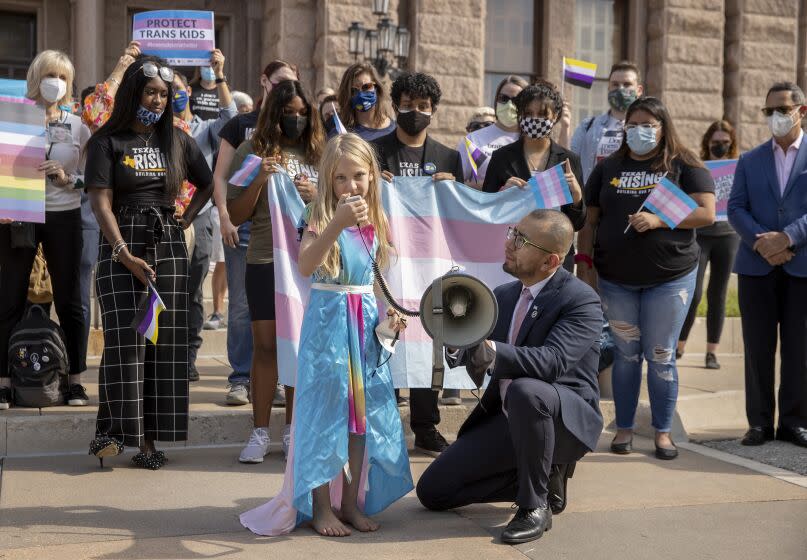
- Oops!Something went wrong.Please try again later.
Kimberly Shappley tried for years to make Texas work for her bubbly transgender daughter, Kai.
Shappley reconsidered her fierce evangelical faith and how she could best show love. She sought fact-based answers in her medical coursework as she studied to become a nurse. She became a vocal LGBTQ+ advocate and moved with Kai, now 12, and her son, Kaleb, 10, from conservative Pearland, Texas, to more liberal Austin.
Still, about a year ago, Shappley decided that wasn't enough — that Kai simply wasn't safe in a state where right-wing politicians had turned misinformation about gender identity and healthcare into a legal framework that threatened her family, and Kai's existence.
So, with the help of a GoFundMe account and the generosity of strangers, Shappley moved with Kai and Kaleb about 10 months ago to Connecticut, where it's been harder to make ends meet but feels safer.
"We're refugees," Shappley said bluntly one recent afternoon. "We didn't have a choice."
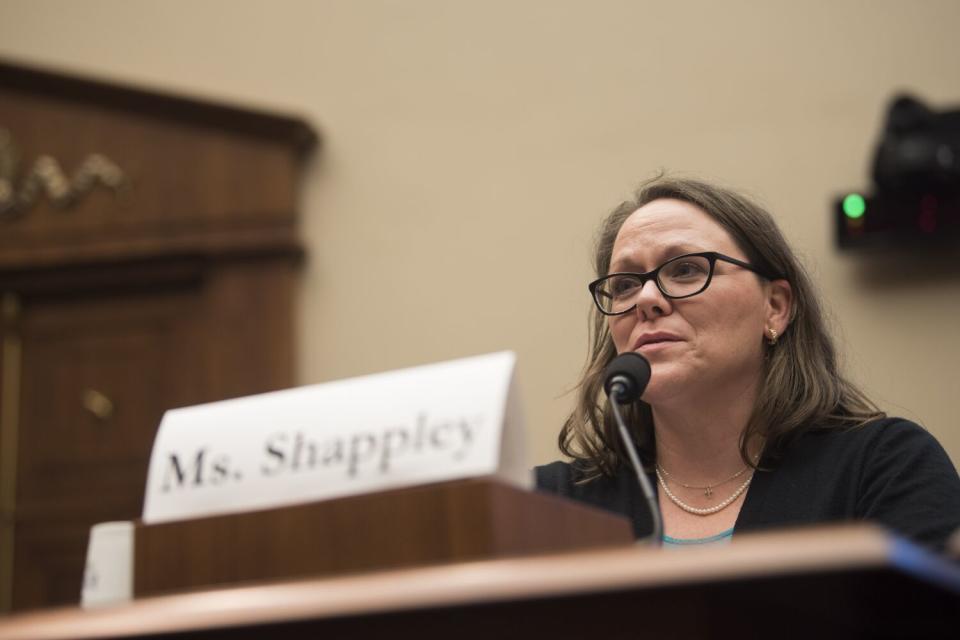
Across the country this Pride month, LGBTQ+ people — and especially trans kids and their families — are struggling against a wave of conservative backlash to the progress they've made in recent decades. That backlash has largely come in the form of hundreds of new laws designed to erase queer identity and suppress forms of expression, such as drag, that buck traditional gender norms.
More than 20 states have now passed laws banning gender-affirming care for kids. In many of those states, proponents of the bills focused on surgical procedures and permanent medical interventions that aren't even part of the standard care for transgender adolescents.
At the same time, the legislation they backed targeted more common treatments — including reversible puberty blockers — that medical experts say are vital parts of care for children who suffer from a disconnect between their birth sex and their true identity, and who experience higher rates of depression and suicide when denied such care.
States have also passed and pursued laws and legal opinions threatening the parents of trans children who receive such care, alleging despite all medical consensus that it amounts to child abuse. They have pursued and passed bathroom laws demanding trans people use facilities aligned with their birth sex regardless of their identities; rules barring transgender kids from competing against their peers in sports; and laws precluding discussion of LGBTQ+ topics in schools while forcing teachers to out queer kids who confide in them.
They have pursued measures that bar drag queens from performing in public, ban books exploring queer themes and deny the very existence of transgender people in laws related to people's sexual rights.
The laws have created a patchwork of inequity for LGBTQ+ people in the U.S. — denying them healthcare and other basic rights in some states but not others, and forcing them to make devastating, financially difficult decisions about where to live and whom to trust.
"It is tough," Kai said one day after school, as she waited for neighborhood friends to come play. "I guess I try my best not to have to see these things and learn these things, but when I have to, it really hurts, and it makes everything difficult."
Fighting back
Leaders and lawmakers in the mostly conservative states passing such laws say they are simply looking out for American kids. They argue children and teens are too young to understand gender or their own identities and are essentially being brainwashed by "woke" adults into damaging their bodies before they're old enough to make such decisions.
Pushing back is a broad coalition of queer people, medical and legal experts, LGBTQ+ rights groups and liberal leaders — including President Biden.
Leading medical experts have lamented the politicization of trans healthcare and denounced the efforts of mostly Republican lawmakers to second-guess widely accepted standards of care using quack science. Liberal leaders and lawmakers have accused their conservative counterparts of fear mongering and misusing LGBTQ+ rights as a political wedge.
Legal rights organizations have flagged 2023 as a watershed year for LGBTQ+ discrimination — with the American Civil Liberties Union tracking nearly 500 anti-LGBTQ+ bills nationwide and the Human Rights Campaign last week declaring a "state of emergency" for LGBTQ+ Americans.
On Thursday, Biden denounced the wave of laws targeting LGBTQ+ people as "callous," "cruel," "hysterical" and "prejudiced," and announced new federal initiatives to protect the queer community — saying that his administration "has their back."
"LGBTQ Americans, especially children: You're loved, you're heard," Biden said.
In addition to speaking out, LGBTQ+ people and their allies are also pushing back, hard, in liberal-leaning statehouses and federal courts — and having some success.
Late in the evening of June 2, Micah Winter — aka drag queen Goldie Dee Collins — was at a big party for the start of Memphis Pride when one of the organizers made an announcement.
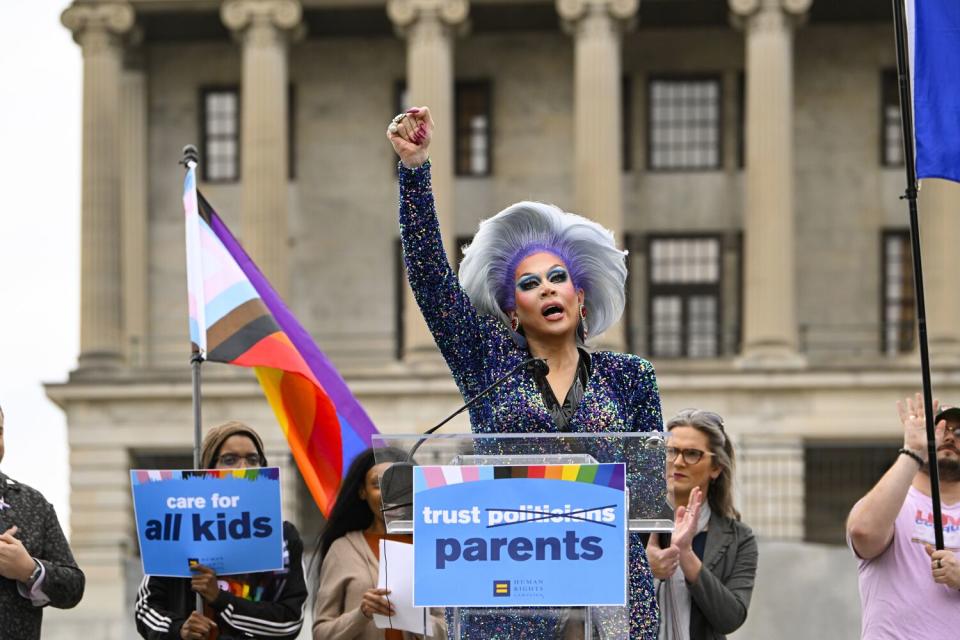
This year, Tennessee passed a law that barred "male or female impersonators" from performing anywhere children might be able to see them. The law intentionally targeted drag queens, though it also raised fears for transgender people. Friends of George's, an LGBTQ+ theater troupe in Memphis that Winter is a part of, sued to block the law.
The news that Friday night was that U.S. District Judge Thomas Parker — an appointee of President Trump — had just issued a ruling tossing the law as unconstitutional. It was a major victory in one of the most closely watched battles over LGBTQ+ rights in the country, and "the crowd just went wild," Winter said.
The rest of Pride weekend, Winter said, he and other members of Friends of George's were toasted as "hometown heroes." Winter, 31, said he kept telling people the win was all of theirs.
"I'm a drag queen, so I love attention and spotlight, but I don't want Friends of George's to take all the attention here," Winter said. "We did it for the entire queer community."
Just days later, attorney Jennifer Levi was celebrating another LGBTQ+ victory.
This year, Florida passed a law banning gender-affirming care for transgender adolescents, including reversible treatments that temporarily delay puberty while young teens, in consultation with their parents, therapists and physicians, consider how they'd like their bodies to mature. Levi, who has defended LGBTQ+ rights in U.S. courts for three decades, helped a group of Florida parents with transgender kids sue.
On Tuesday, U.S. District Judge Robert Hinkle — an appointee of President Clinton — issued an order rejecting the state's rationale for the law as unscientific and misinformed, and granting the parents' request to block its enforcement on the grounds that it is likely unconstitutional.
Levi, 58, called it a "big decision" — one that rejected political bluster in favor of testimony from doctors "who have treated patients and have expertise in this area and who all agree on the essentials of the medical issues."
Dr. Meredithe McNamara, an assistant professor at Yale School of Medicine who treats trans youths, and Anne Alstott, a law professor at Yale Law School, are part of a multidisciplinary team tracking legal efforts to restrict gender-affirming care across the country. They agreed Hinkle's decision was important.
According to their research, proponents of gender-affirming care bans across the country have used the same five-step "disinformation playbook," McNamara said: They deny transgender people even exist; falsely claim children are being subjected to irreversible treatments such as surgeries; falsely allege treatments that are being provided to kids are unsafe or unproven; deny that care standards are backed by decades of research; and attack the legitimacy of medical authorities who say otherwise.
McNamara and Alstott said it is sad the strategy has worked in so many state legislatures, where politicians have intentionally ignored rebuttals based in science and medicine, but encouraging that courts are starting to reject such arguments as groundless.
"What we're seeing in these [gender-affirming care cases] is that when courts hear both sides, they are able to call out misinformation and render sound decisions," Alstott said. "It really has been heartwarming, as a law professor, to see the law work."
Alstott said that some cases will undoubtedly be appealed and that LGBTQ+ people are justified in worrying about conservative judges — including on the U.S. Supreme Court — upholding anti-LGBTQ+ laws.
But, she said, she's hopeful that the rule of law — the reliance on facts — will lead to more LGBTQ+ victories.
Bolstering community
Beyond the courts, LGBTQ+ people and their allies are also pushing back by further enshrining LGBTQ+ rights in bluer states and shoring up supportive communities there.
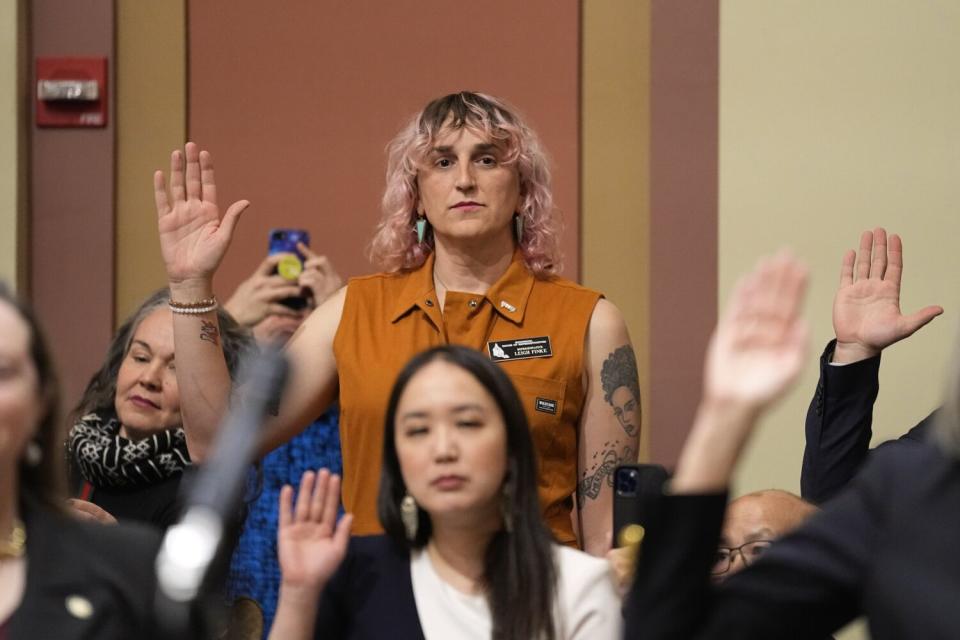
This year, Minnesota Rep. Leigh Finke, who is transgender, helped rally her colleagues to pass a Trans Refuge law that provides legal protections for individuals seeking or receiving gender-affirming care in the state. Finke said the bill was a necessary counterpoint to those banning such care in neighboring states.
Finke said she and her office were barraged with angry, vitriolic emails and calls from people who opposed the legislation, but also buoyed by an outpouring of love from supporters.
"The amount of uplift I have received has been amazing, and just being able to be a part of the movement that we are in right now — it makes me emotional just thinking about it," Finke said. "It's so important for our community right now to have a voice."
Dr. Angela Kade Goepferd, medical director of the gender health clinic at Children's Minnesota, helped advocate for Finke's bill, along with families and trans kids receiving care at the clinic.
Goepferd, 45, who is nonbinary, said they felt a duty to use the tremendous medical expertise at Children's to help explain to lawmakers what gender-affirming care actually looks like for kids, and why there is medical consensus around its efficacy.
Under established standards of care, kids are not getting surgeries. Adolescents reaching puberty may receive reversible puberty blockers, in consultation with their medical teams, to delay their development until they are a bit older. Older teens may elect to start hormone therapies to help align their bodies with their gender identities, but that too is only after intense consultation with medical teams.
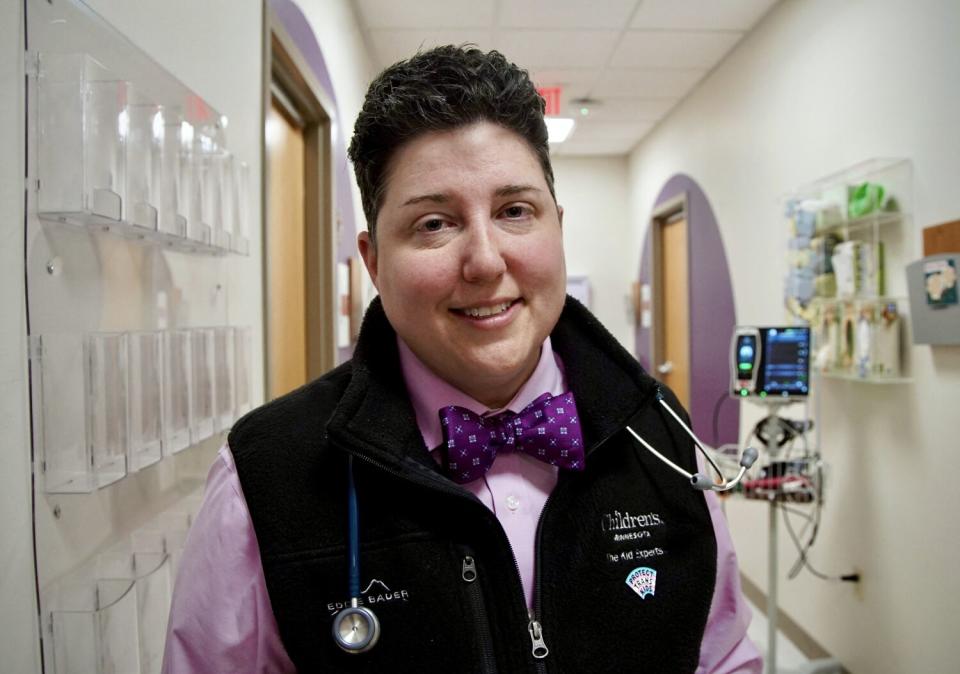
"This is an area of medicine that's been around for a while, and that really prior to this kind of manufactured controversy around trans kids and their healthcare, was really not controversial in the fields of pediatrics and medicine," Goepferd said. "It really can be lifesaving."
For Hao and Gretchen Nguyen, whose 6-year-old daughter, Asher, is trans, having such support at Children's has been vital — and the idea of going without it is terrifying.
"It gives us the assurance and ease and confidence of knowing that we are having medical professionals guide our path," said Gretchen Nguyen, 36, who is an attorney.
"These are just basic human rights," said Hao Nguyen, 40, a prosecutor. "For states or the far right or whatever to take those basic human rights and then galvanize them and arm them into political weapons is really kind of disgusting, and it has real impacts on real families."
Andy, 43, and Andrea, 44, whose 14-year-old son, B., is transgender, feel the same. They asked to use just their first names, and B.'s first initial, to protect their family from hate.
Andy, a professor, said the idea that B.'s use of gender-affirming care is "somehow impulsive by [B.] or us or that we're pushing some sort of agenda" is ridiculous. In fact, he said, it has been a long, careful process in which B. has been surrounded at every step by a team of doctors.
"It's about allowing my child to express their identity," said Andrea, an attorney, "and not suffer mental health consequences needlessly."
B., who likes math and rock climbing and plays the cello, said on most days now, he wakes up feeling normal and happily heads off to school like any other kid. That would not be the case, he said, without the care he receives at the clinic.
B. is on puberty blockers, which he started after he and his medical team began noticing signs that his body was hitting puberty and about to start changing in feminine ways — which racked him with anxiety.
In the national debate around such care, critics argue that puberty blockers harm children by disrupting their natural development. B. said he sees it as quite the opposite.
"No one ever points out how much it would hurt me if I couldn't have gender-affirming care, what irreversible harm that would cause," he said.
"Before I stated puberty blockers, I was starting to get very distressed and anxious about how I looked," he said. "If I didn't have gender-affirming care, I would have to pretend to be someone else all day long. I would never feel like myself, and I wouldn't be happy about the person I would be pretending to be."
Goepferd said they see the benefits of gender-affirming care in the smiles of happy kids every day and were tremendously gratified to see the Trans Refuge law pass. But it was also bittersweet, they said, considering the wait to get into their clinic is now a year long and getting only longer as more kids from states banning such care come looking for help.
"It's a real hard position for all of us to be in," Goepferd said. "We can't be taking entire states' worth of young people who are transgender and shipping them to a different state to get healthcare."
In California
Among the hundreds of bills being tracked by the ACLU, only one was in California.
The bill, sponsored by Republican Assemblymen Bill Essayli of Corona and James Gallagher of Yuba City, would have required school employees to notify parents within three days if their child identified as transgender at school.
Critics blasted the bill as one that would out and potentially endanger trans children, while violating student privacy protections under California law. The bill died in committee.
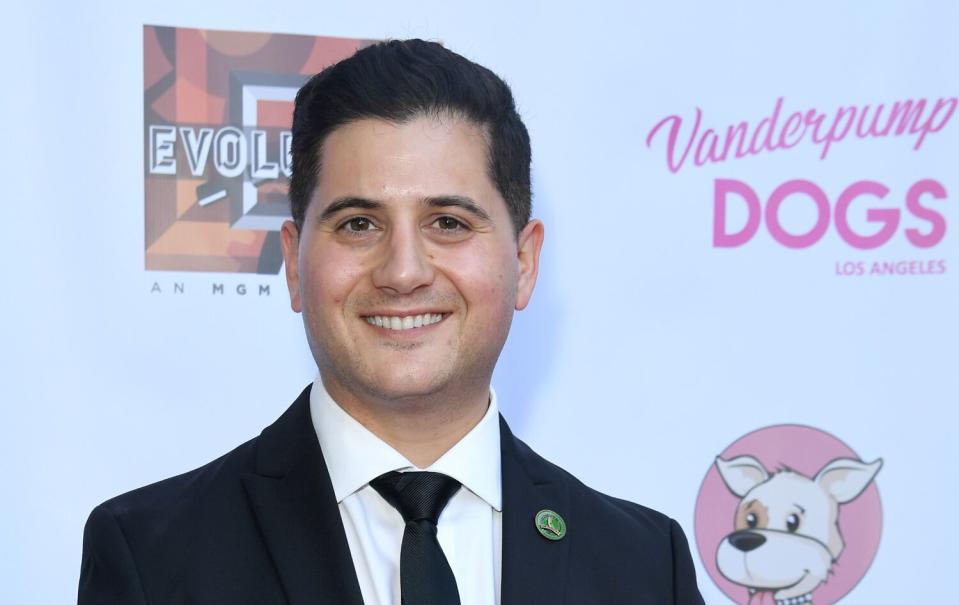
Essayli said he was disappointed the legislation was labeled "anti-LGBTQ+" and lumped together with other bills targeting queer people across the country. He said his intention was not to target LGBTQ+ kids but ensure that parents are kept in the loop if their kids are struggling with their gender identity.
"Is every parent going to be accepting immediately? I don't know. Probably not," Essayli said. "But the point is the parents need to be able to go through that journey with their kid."
Essayli said he figured the bill might not pass in Sacramento, where Republicans are vastly outnumbered by Democrats, but wanted to put it forward anyway to pressure state officials into providing more clarity around the issue.
"I know there's a lot of parents who are very interested in this," Essayli said, "and they're going to be going to their local school boards and asking for some clarity and some guidance."
Schools and school boards are already an LGBTQ+ battleground in the state.
In recent weeks, the idea of celebrating LGBTQ+ pride in schools has sparked violent protests outside an elementary school in North Hollywood and a school board meeting in Glendale. A school board in Temecula recently rejected a textbook because it mentioned gay rights activist and San Francisco politician Harvey Milk.
Still, far more California officials have spoken out in support of LGBTQ+ rights in the state, positioning the state as part of the resistance to queer hatred and discrimination.
Gov. Gavin Newsom, a Democrat, has intentionally positioned himself as an ally willing to stand up to other leaders — including Florida Gov. Ron DeSantis, a Republican — who are threatening LGBTQ+ rights elsewhere in the country.
In a recent video celebrating Pride month, Newsom and his wife, Jennifer Siebel Newsom, lauded California's efforts to bolster LGBTQ+ rights — including around gender-affirming care — while criticizing states that are moving in the opposite direction.
"All across the United States, you're seeing other states that are targeting people simply, well, for existing, threatening their healthcare, their livelihood, and threatening their freedoms," Newsom said over an image of DeSantis.
"California, we're not going to let that happen," Newsom said. "We're doubling down on our pride in the LGBTQ+ community."
Looking ahead
How the culture war around gender-affirming care and other LGBTQ+ issues will play out in the long run is anyone's guess. But many LGBTQ+ people say they aren't taking any chances.
Eli, 29, and Lucas, 26, an engaged transgender couple who asked to be referred to only by their first names for safety reasons, were born and raised in Florida and still live there, close to many of their family and friends. But they are planning on uprooting their lives and moving to Minnesota this fall, Eli said.
The anti-LGBTQ+ laws DeSantis has signed in recent months — including one that makes it illegal for trans people to use public restrooms matching their identities — have gone too far, he said. Lucas' healthcare provider recently notified patients that it intended to stop providing gender-affirming care in the state, leaving the couple scrambling to find a new provider. They don't want to live anymore in a state where such threats loom around every corner, Eli said.
The move won't be easy. Eli will be able to keep his remote job as an internet repair and technical specialist, but Lucas will have to leave their job in financial aid. Still, the couple are hopeful.
"We're just looking to be ourselves," Eli said, "in a society that accepts us."
For Kimberly Shappley and 12-year-old Kai, the future evokes both hope and fear.
Kai — who likes drawing, knitting, acting and Dolly Parton and is the co-author of a published book about a transgender cheerleader in Texas — is in a public school in Connecticut that she likes, and said things have been going great.
Bubbling with confidence, she said she pictures a future in which she's famous — which seems possible, considering her charisma.
"What's there not to like?" she said, when asked what it's like to be her. "I mean, I'm fabulous."
Shappley is still working as a tele-medicine nurse with the same company she worked for in Texas, and is getting used to Connecticut too, she said. But she's also worried about the next presidential election and attacks on LGBTQ+ and transgender rights spreading, and is trying to save money — just in case the family has to move again.
"We can't settle," she said, clearly frustrated. "We can't just put an anchor down and say, 'This is home.'"
This story originally appeared in Los Angeles Times.

